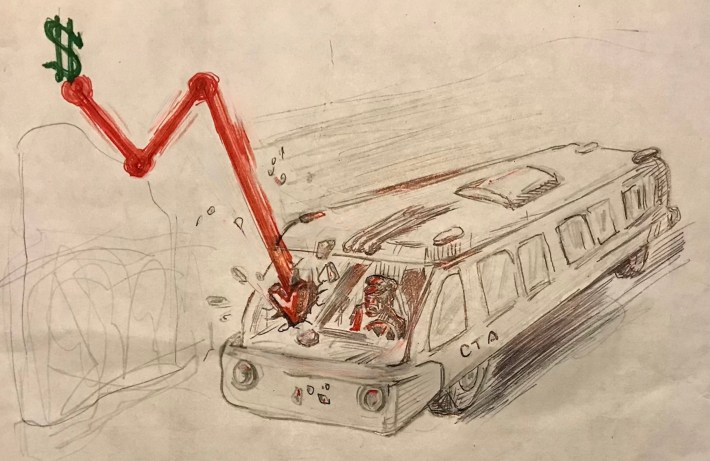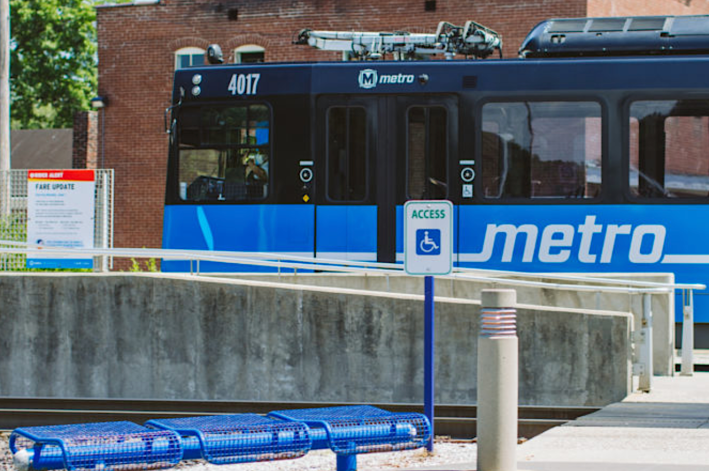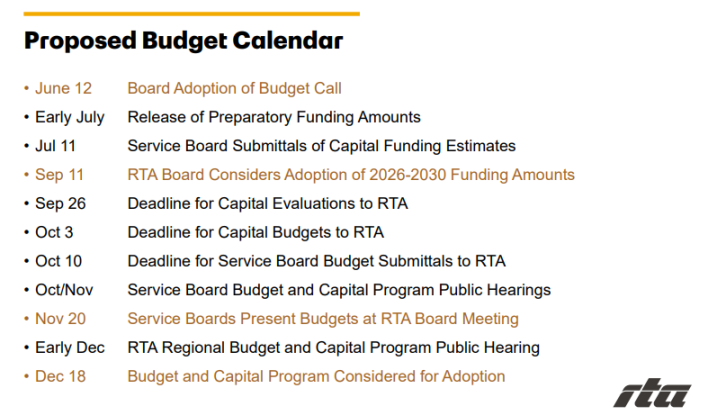
Check out our interview with House Speaker Welch about public transportation funding here.
Read Streetsblog's recent interview on this topic with Senate President Harmon here.
Read our interview with Sen. Villivalam on this subject here.
Check out our interviews with State Sen. Mike Simmons and State Rep. Hoan Huynh on the topic here.
"So never mind the darkness
We still can find a way
'Cause nothin' lasts forever
Even cold [October] rain"
- "Cold [October] Rain" by Guns N' Roses, 1991
The unseasonably chilly, gloomy weather today in Chicago makes me think of the impending autumn, which brings to mind Chicagoland's looming transit fiscal cliff. Now, the weather is nothing to panic about – we've still got more than a month left until the last day of summer. But the approaching monetary chasm is a big deal, because if $771 million isn't allocated for public transportation soon, some 40 percent service cuts and 3,000 layoffs are projected.
Currently Illinois legislators are trying to pass a funding and governance reform bill that would not just plug the budget hole, but ideally raise $1.5 billion to improve the northeast Illinois transit network, and provide $200 million for downstate systems. While HB 3438 passed the State Senate on May 31, at the very end of the spring legislative session, the House didn't vote on it. House leaders Streetsblog Chicago has interviewed says they're working on crafting the "right" legislation in time for the fall veto session, scheduled for October 14-16 and October 28-30.
Today Streetsblog caught up with one of the key players in the current Springfield drama, House Majority Leader Eva-Marie Delgado, a Democrat whose district includes parts of Chicago's Northwest Side. Along with fellow Chicago Democrat Rep. Kam Buckner, she's co-leader of the House's Public Transit Working Group, which is trying to solve this very tricky legislative puzzle.
The interview has been edited for clarity and brevity.
John Greenfield: As you know, things are getting down the wire, and we're in danger of drastic transit service cuts and layoffs. Would you be willing to settle for legislation that would just get that $771 million we need now? Or do you think it's necessary to push for the $1.5 billion per year that the Regional Transit Authority and transit advocates are calling for?
Leader Eva-Dina Delgado: I deeply believe that we need to fully fund and reform our transportation system, and so for me, that is the ultimate goal. I would also remind you that the $771 million, that hole that's contemplated for the coming year, that takes into account that there is still $200-plus million in federal [COVID-19] funding that they have made stretch through next year, so the hole is just going to get bigger. [Laughs.]
So addressing that one-time issue right now doesn't really address the issue with transit. It would just be a short-term bridge. And when we're talking about transit, particularly on the House side, we're talking about trying to create a system for the future. And just throwing more money at a broken system doesn't really get us to that solution. And I think I can speak for my colleagues when I say many of them have a problem with just throwing money at a system that is going to continue to operate the way it does today. So while the funding is important, it's not just about the funding. It is about reforming the system, and then fully investing in it.

JG: Now my assumption is that the transit-friendly Democratic lawmakers in Springfield, you're all generally pretty cordial. However, there seems to be a bit of a "they said, they said" thing going on. I've interviewed a bunch of legislators, and Senate President Don Harmon and Sen. Ram Villivalam basically said, "We passed a bill, and the House should either vote for it or propose an alternative plan."
Of course, when you folks didn't vote for the bill on May 31 at the end of the spring legislative session, you had a pretty good reason not to. You got it at the last minute, so I think you would have needed a 60 percent supermajority vote.
LED: [Laughs.] Yeah, we definitely wouldn't have had enough time to pass it before midnight [in order to be able to pass it with a 51 percent simple majority].
JG: House Speaker Chris Welch and Rep. Buckner essentially told me, "We're crafting the 'right' bill, and we're not going to rush. But don't worry, we'll get it passed in the six-day October veto session with the 60 percent super majority vote."
So you can see how that makes people – transit workers and transit agencies and transit advocates – a little nervous. [RTA Director of Government Affairs] Rob Nash said it seemed like it's a heavy lift to try to get this passed in six days, especially with the 60 percent margin.
So my question for you is, what are you folks doing to win support? I know you haven't completely crafted your bill yet. Rep. Buckner said you've been doing a lot of field trips, talking with people in other cities and talking to people at transit agencies around the state. I was really impressed by his knowledge of all the different agencies in different parts of the state that I hadn't even heard of, so you folks are definitely doing your homework.

But it seems like it's really important to nail down exactly what you want to do, and then start making sure you've got all the votes you need to pass that with the supermajority in October. So are there negotiations going on with legislators who might be hesitant to vote for new taxes or fees or surcharges to fund transit? I know the Senate bill would include $200 million Downstate transit.
So what sort of stuff are you folks doing to make sure that you have enough votes in the House to get a bill passed?
LED: As I'm sure Speaker Welch and Leader Buckner told you, the House has we have our own way of doing things, and it's definitely a way to drive consensus among 78 [Democratic] members. So as you can imagine, 78 members is a lot of people with a lot of different opinions, a lot of different perspectives, right? So we have used the working group method, where we bring people together, and we spend time just sitting in a room and talking about different issues and learning about the policies, and then trying to make decisions that everybody can get behind, and then go out and make sure the rest of the folks in the House know about it and understand it.

And that process has really worked well for us. So the House working group on public transit, there's 16 members, and we've been meeting weekly since the spring session ended, we took a short break in June, but came right back to work, continuing to discuss all of the different issues that we better put together.
The Senate bill, I think, is a good start, because we share a lot of the same goals. But we're also looking at, not only the revenue package. But we're also looking at how our reforms are going to impact the operational aspect of these agencies. Because at the end of the day, CTA, Metra, and Pace, they all have to put service on the street, and at no point do I want our reforms to somehow impede or stop that day-to-day operational stuff.
And so we've had a chance to have those conversations with the service boards. We've had a chance to discuss, how do we make sure that we don't interrupt operations but still drive towards that goal of a more regional approach to providing transit and more connectivity in the suburbs, more connectivity between the suburbs and the city, making it less about a daily downtown commute and more about regional access to all the different places you may want to go around here.
So you know, we're talking about all of those things and the key differences between what the House would like to do, and what the Senate would like to do, those the details. Funding mechanisms, revenue tools, governance, the composition of the boards, making sure that all of that every corner of the region feels like they have a voice in this conversation, because they should.
So talking about all those things, plus talking about what that revenue mix looks like, and making sure to make sure that that revenue is progressive, because we don't want to [unduly impact] the folks that can least afford to do it. To fund things like this. We want to make sure that we're spreading that burden out, and having the wealthiest in our state make sure that they're paying their fair share. These are all conversations that are happening.
We had a two hour meeting today, where we talked about a lot of these things. So that is how we build consensus in the House. I think Speaker Welch has very intentionally put these groups together to make sure that we're building legislative products that people can get behind, people can explain, people understand, and they can go back home and be proud of what you've done.
So I think that's how we get we get to 71.
JG: Okay, what happens if that doesn't happen? What if you're not able to get the supermajority during the fall session? Will there be enough time to pass a bill with a simple majority before the service cuts and layoffs become permanent? I think that would happen at the end of the year, New Year's Day or something, although they might have to vote on what what budgets they're going to have at an RTA board meeting.

So do you have a Plan B in case stuff doesn't pass during the veto session?
LED: Well, I'd say that the goal is to finalize legislative language this summer and make sure we get a bill passed between both chambers before before any of those service boards have to make any Draconian cuts.
And historically we've had to tackle really complicated things. Transit is one of those very complicated things. But we know what our goal is, and that's what we're going to keep striving for.
And I also would say that we're in constant communication with the transit agencies and the service boards, and they are going through their process. They have to do their budgeting. We statutorily require them to do a lot of things with their budget, which is also something that I'm diving into and seeing. They don't want to make the cuts, I certainly don't want to make the cuts. So we're doing everything we can to collaborate with them and make sure we get to where we need to get without having to cause any undo strife for folks.
I know that as a rider, that may be cold comfort, that's fair. I know I've been hearing it from my constituents. But the goal, ultimately, is to get this done in the veto sessions and get across the finish line.
JG: All right. Was there anything else you want to say?
LED: I wanted to drop a couple of points about paratransit, because I think sometimes it gets glossed over, and it's an important part of what we talk about when we talk about transit. It's a significant and important service that we provide, and a big part of the discussion around cost drivers coming out of free and reduced rides, and also paratransit. And because paratransit is such an important part of the discussion, I kind of want to flag that as an issue.
It's certainly something that I'm hearing about from the disabilities community and making sure that we protect that service in any way we can, of course, that is on our radar.
Check out our interview with House Speaker Welch about public transportation funding here.
Read Streetsblog's recent interview on this topic with Senate President Harmon here.
Read our interview with Sen. Villivalam on this subject here.
Check out our interviews with State Sen. Mike Simmons and State Rep. Hoan Huynh on the topic here.

Do you appreciate Streetsblog Chicago's paywall-free sustainable transportation reporting and advocacy? We officially ended our 2024-25 fund drive last month, but we still need another $44K to keep the (bike) lights on in 2026. We'd appreciate any leads on potential major donors or grants. And if you haven't already, please consider making a tax-deductible donation to help us continue publishing next year. Thanks!




